Imagine getting into your dream college after all your hard work. Yet, the thought of managing huge expenses feels overwhelming. Luckily, there’s help through financial aid for students. It lets you pursue your dreams without worrying about costs. Each year, scholarships and funding offer chances for thousands of students, maybe even you.
The FAFSA application is crucial. It unlocks Pell Grants for those in great financial need12. This isn’t about just making ends meet. It’s about thriving without loan repayments2. Athletic and merit-based scholarships reward your talents and achievements1. Your home state could even help with grants, and schools might offer special scholarships based on need or merit1.
In Vermont, residents access grants that fit their financial situation. These can be used even out of state, defining ‘financial aid’3. Vermont’s grants can help for up to ten semesters, supporting a big part of your college journey3. These grants look at more than income, considering assets, family size, and other factors3. Imagine college as a journey made possible by grants and scholarships, not blocked by financial barriers.
College affordability is a hot topic. Armed with the right tools and knowledge, you can move towards educational success and a better career. Remember, grants and scholarships are not just funds—they’re investments in your future.
Key Takeaways
- Begin your financial journey with the FAFSA application to open doors to myriad aid possibilities.
- Leap beyond the boundaries of financial restrictions with Pell Grants and other federal programs12.
- Harness the power of merit-based and special talent scholarships to highlight your unique abilities1.
- Embrace state-specific grants, like Vermont’s, tailored to your residency and academic goals3.
- Leverage institutional scholarships and tuition waivers to reduce educational expenses1.
- Consider work-study programs to gain employment experience while managing educational costs1.
- Reapply yearly for aid to ensure continued support throughout your educational journey3.
The Untapped Potential of Scholarships in Achieving Career Goals
Imagine a world where your education isn’t limited by your wallet. College scholarships make this dream a reality. They let you go to top schools without the heavy burden of student loans. Scholarships let you focus on reaching your career goals, not just your bank account.
Access to Prestigious Universities and Resources
Scholarships open doors to elite universities and exclusive resources. You’ll get access to top-notch labs, big libraries, and meet-ups with industry leaders. Getting a scholarship means you can study at famous schools, no matter your background. It levels the playing field in competitive careers4.
Degrees Without Debt: Financial Freedom Post-Graduation
One big plus of scholarships is finishing school debt-free. This means you can use your money for future plans, like a house or more education, not loans. Starting on scholarships early reduces the need for loans. This can save you a lot of money on interest5.
Enhancing Resumes and Attracting Employment Opportunities
A scholarship does more than cover tuition; it boosts your resume. It shows you’re hardworking and supported by a group, which employers like. Scholarships often include internships and networking, helping you start your career45.
- Mentorship Programs: Gain guidance and career advice from established professionals.
- Internship Opportunities: Experience hands-on practice in real-world scenarios.
- Networking Platforms: Connect with peers and professionals, expanding your industry contacts.
With smart planning and hard work, scholarships can benefit you long after graduation5.
In conclusion, using grants for students or college scholarships opens many doors. They offer more than financial aid—they give you a foundation for a successful future.
Financial aid for students: A Pathway to Advanced Education
Getting a higher education is a big step forward, offering wider career options. But, it comes with financial challenges. Federal help, state aid, and scholarships are crucial for making college affordable. These programs help students with the cost so they can study and aim for their career goals without financial stress.
Employment vs. Education: Balancing Work and Academia
Many students work and study at the same time due to necessity. The Federal Work-Study (FWS) program helps by providing part-time jobs for these students6. With FWS and other federal student aid7, students can afford an education without giving up on study time.
Expanding Horizons with Educational Tools and Technology
Scholarships provide crucial funds, but they also open doors to new learning tools and technology. Merit-based scholarships reward academic success with financial support8. Need-based scholarships help with tuition and other educational costs, letting students access important digital learning resources8.
Building Connections Through Scholarships
Winning scholarships connects students with a community of scholars and professionals. Programs like the Gates Millennium Scholarship or the Coca-Cola Scholars Program offer more than just money8. They help students meet mentors and experts, building networks that help their careers7.
To help students understand financial options and manage student loans, there’s a free online course available at EverFi Pathways. This course teaches you how to evaluate the cost of education and create a smart budget for loan repayment.
FAQ
How do educational grants alleviate the financial burden of higher education?
What types of financial aid for students are available?
Why are college scholarships crucial in achieving my career goals?
How can I maximize my chances of receiving scholarships and grants for students?
Can financial aid impact my employment opportunities after graduation?
How can financial aid resources help me balance work and academia?
In what way do educational tools and technology play a part in advanced education, and how does financial aid help?
How do scholarships facilitate the building of professional connections?
What should I consider when searching for tuition assistance programs?
What strategies can increase my chances of gaining higher education funding?
Source Links
- Scholarships, Grants, and Financial Aid: Maximizing Opportunities for College Funding – https://genesisfinancialgrp.com/blog/scholarships-grants-and-financial-aid-maximizing-opportunities-for-college-funding
- Grants, Scholarships & Loans: What’s the Difference? – School of Education – https://drexel.edu/soe/admissions/financial-aid/difference-between-student-grants-vs-loans/
- Grants—VT State, Federal & College Grants – https://www.vsac.org/pay/student-aid-options/grants
- Untapped Potential: Opportunities Through Scholarships Report – https://www.rbc.com/en/future-launch/resource-type/research-insights/untapped-potential-scholarship-report/
- Scholarships 101: A Guide to Securing Financial Aid for University – https://moldstud.com/articles/p-scholarships-101-a-guide-to-securing-financial-aid-for-university
- Financial Aid Programs Overview | Financial Aid – https://www.usm.edu/financial-aid/financial-aid-overview.php
- Financial Aid for Students | Colorado Department of Higher Education Home – https://cdhe.colorado.gov/students/preparing-for-college/financial-aid-for-students
- Navigating the Path to Higher Education: Financial Aid & Scholarships – https://info.methodlearning.com/blog/navigating-the-path-to-higher-education-financial-aid-scholarships


